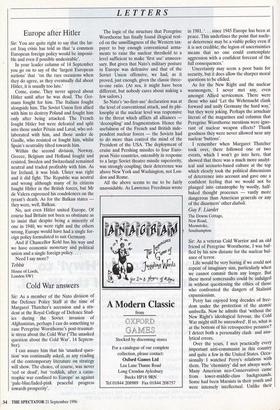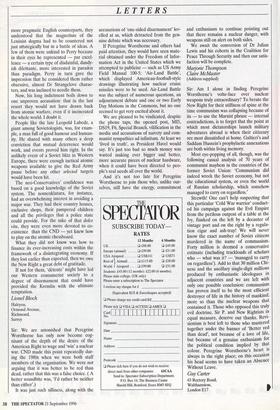Sir: As a veteran Cold Warrior and an old friend
of Peregrine Worsthorne, I was baf- fled by his new distaste for the nuclear bal- ance of terror.
Life would be very boring if we could not repent of imaginary sins, particularly when we cannot commit them any longer. But these moral somersaults could be indulged in without questioning the ethics of those who confronted the dangers of Stalinist expansionism.
Perry has enjoyed long decades of free- dom under the protection of the atomic umbrella. Now he admits that 'without the New Right's ideological fervour, the Cold War might still be unresolved'. If so, what is at the bottom of his retrospective penance? I detect both a personality clash and ana- lytical errors.
Over the years, I met practically every important anti-communist in this country and quite a few in the United States. Occa- sionally I watched Perry's relations with them. The 'chemistry' did not always work. Many American neo-Conservatives came from lower-middle-class backgrounds. Some had been Marxists in their youth and were intensely intellectual. Unlike their. more pragmatic English counterparts, they understood that the magnetism of the Leninist dogma had to be countered not just strategically but in a battle of ideas. A few of them were unkind to Perry because in their eyes he represented — par excel- lence — a certain type of disdainful, dandy- ish dilettante, more interested in paradox than paradigm. Perry in turn gave the impression that he considered them rather obsessive, almost Dr Strangelove charac- ters, and was inclined to needle them.
Now, his long indictment boils down to one unproven accusation: that in the last resort they would not have drawn back from atomic warfare, even if it incinerated the whole world. I doubt it.
People like the late Leopold Labedz, a giant among Sovietologists, was, for exam- ple, a man full of good humour and human- ity. He shared with many others a deep conviction that mutual deterrence would work, and events proved him right. In the unlikely event of a Soviet blitz in Western Europe, there were enough tactical atomic weapons available to give the Red Army pause before any other selected targets would have been hit.
The neo-Conservatives' confidence was based on a good knowledge of the Soviet system. The nomenklatura, for instance, had an overwhelming interest in avoiding a major war. They had their country houses, exclusive shops, their pampered children and all the privileges that a police state could provide. For the sake of that dolce vita, they were even more devoted to co- existence than the CND — yet knew how to play on the atomic chessboard.
What they did not know was how to finance its ever-increasing costs within the framework of a disintegrating economy. If they lost earlier than expected, then we owe the New Right a great debt of gratitude.
If not for them, 'détente' might have led our Western consumerist society to a degree of disarmament that could have provided the Kremlin with the ultimate temptation.
Lionel Bloch
Halcyon, Ormond Avenue, Richmond, Surrey



















































































 Previous page
Previous page